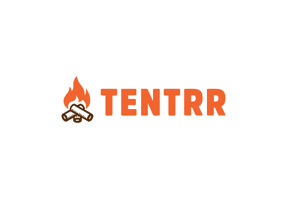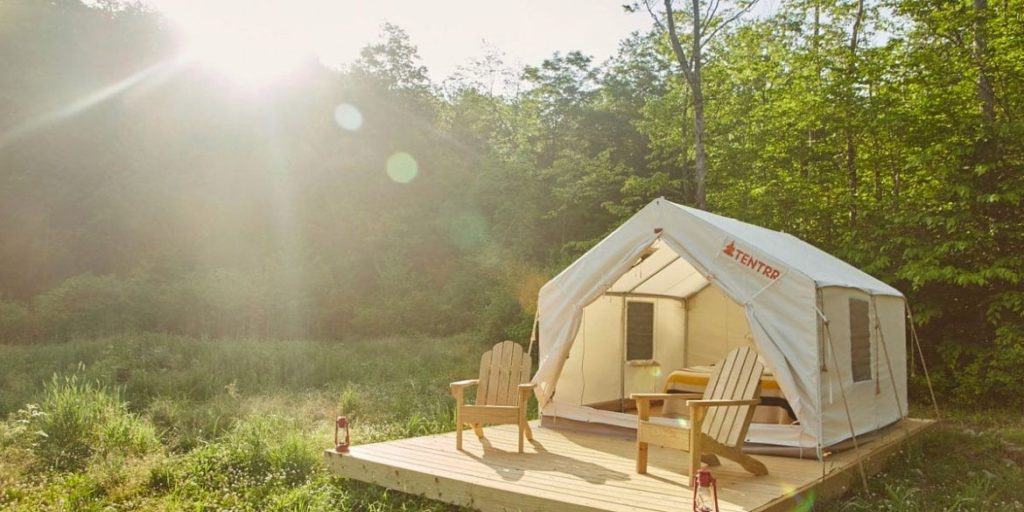Tentrr – Your Private Camping Experience

Tentrr is a shared economy camping company that connects those looking for a fun camping experience with private landowners who share a portion of their land in order to facilitate an awesome camping experience.
Tentrr – Your Private Camping Experience
The Problem: Public camp sites can often be noisy, overcrowded, run down and not incredibly clean.
The Solution: Tentrr is a marketplace that connects landowners with people who want to enjoy the great outdoors effortlessly, providing a fun and private camping experience for consumers while unlocking and monetizing millions of acres of beautiful land. Tentrr is a shared economy camping company that connects those looking for a fun camping experience with private landowners who share a portion of their land in order to facilitate an awesome camping experience.
Demand-side: The camp site rental market opportunity is a roughly $24 billion dollar industry. Camping is second to only bicycling as the most popular outdoor recreational activity and roughly 77 million Americans went camping in 2018. The average per night spend on camping varies between between $30 – $110. Most camp sites are owned and operated by the government.
Supply-side: There are roughly 9 million privately owned U.S. properties that are 10 acres or more. Tentrr works with these land owners and set’s up a private camp site on a small portion of their land. Tentrr charges on average $150 per night, of which they keep ~35% with the remaining 65% going to the land owner. This provides the land owner with a modest stream of positive ancillary income.
Marketing: Tentrr advertises for campsite acquisition through a variety of channels including: direct mail, regional print, radio, email, Facebook and referrals. The company advertises for camper acquisition through predominantly influencer marketing, digital media and affiliate co-marketing.
Scalability & Customer Wallet Share: Although Tentrr’s model may be slightly more difficult to scale due to the need to set up a camp site, the business does attract repeat users and has proven they can expand their customer wallet share by offering activities on the properties such as fishing and boating as well as selling camping accessories such as lamps and blankets.




I’ve hosted one of my birthdays at a Tentrr site, and it was one of the best yet! On their website I was able to find a gorgeous spot in an abandoned zoo, with a tent, a fire pit, and everything we needed to have an amazing weekend. The site takes the due diligence out of the entire process, giving you exposure to so many parts of the country previously difficult to find. For those of you that have never tried this, I highly recommend!!
This is amazing! I love the unique aspects of this experience compared to going to a typical campsite or campground. I am also amused at the idea of camping on private land. To take a more skeptical POV though, what is stopping AirBnB from doing the same thing? With Airbnb Backyard, AirBnb is building homes – could they also build tents and camping spaces?
Love it! Great way of making unutilized spaces available to the public. And so smart given there are few alternatives for camping aficionados than government or state run camping sites, which for most popular trips have become so demanded. Official camping sites in Yosemite and other California parks are fully booked months in advance! And it’s not only a US problem, same is happening in the Torres del Paine national park in the Chilean Patagonia. Great that Tentrr brings more alternatives and convenience for camping enthusiasts!
I think it is a very interesting idea, but I am skeptical. My first reaction is that the price might be a barrier to a lot of customers. $150 per night for a space on the ground to camp is a lot compared to ~$20 charged by a typical camp ground. $150 is like staying at a hotel, and I am not sure if this is the price campers are willing to pay. I think part of camping appeal is that it is essentially free. My second reaction is regarding the location itself. The allure of campsites (and the reason why they are owned by governments) is that they are usually located on the grounds of national parks. I doubt public individuals own properties there that they would be able to provide to Tentrr customers. While it might be a great solution for a small portion of the camping market, I think that anchoring on the $24bn market size is a risky bet.
This is very interesting platform that I had not heard of. The value add for consumers and supplies alike is clear. Notably, suppliers with idle land will make 65% of the payment. As you mentioned, Tentrr uses modern methodologies such as working with influencers. This makes me fear that Tentrr may be a fad. How does the company cultivate longevity and loyalty? How does it position itself when compared to Airbnb, etc.? Are there safety concerns?
This is one of the great examples of the shared economy. The company essentially creates value from nothing. Space that otherwise would not be used is rented out to campers. For AirBnB, I see the problem that increasingly hotels and professional landlords use the site. This seems to undermine AirBnB’s original ideal of connecting consumers with consumers and could potentially hurt the company in the long term. However, Tentrr is immune to this trend as it creates a market which would otherwise not exist. Obviously, creating a market is more difficult and takes more time than just taking away market share (you described the efforts to source space), but I don’t see a problem to scale as you suggested. In contrast, there does not seem to be a natural competitor.
I’ve never heard of Tentrr until reading this blog post, and will definitely try it out some time in the future! Although everything seems great about this platform, I do feel a little concerned about the commission rate it charges land owners. Do you think their average commission rate at 35% is a bit too high for land owners, who may be incentivized to dis-intermediate the next time they rent camping area to the same customers? And on the scalability point, I agree that they might not become a unicorn because the market it serves is limited. But I also think there could be an opportunity for Tentrr to be acquired by a much bigger player such as Airbnb.